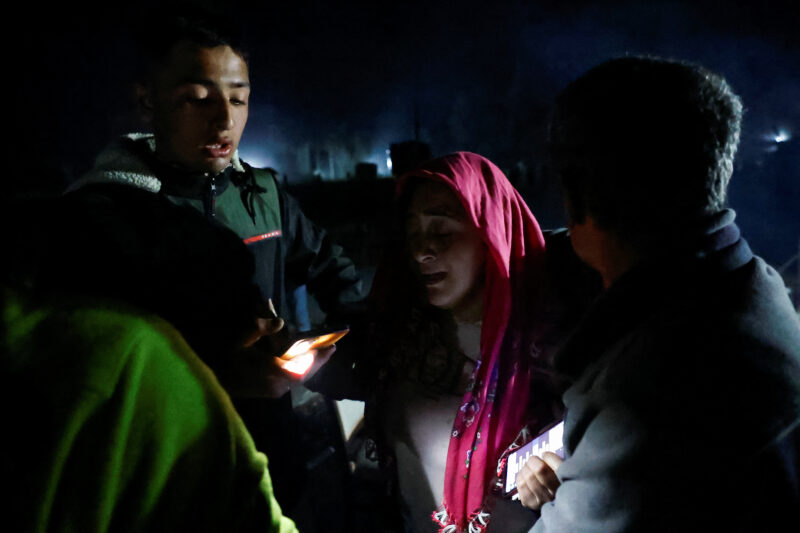ANTAKYA, Turkey (Reuters) – Six people were killed in the latest earthquake to strike the border region of Turkey and Syria, authorities said on Tuesday, two weeks after a massive tremor killed more than 47,000 people and damaged or destroyed hundreds of thousands of homes.
Monday’s quake of magnitude 6.4 was centred near the Turkish city of Antakya and was felt in Syria, Egypt and Lebanon.
It was followed by 90 aftershocks, Turkey’s Disaster and Emergency Management Authority (AFAD) said, even as rescue work from the initial tremors on Feb. 6 have been winding down.
“I thought the earth was going to split open under my feet,” said Muna Al Omar, holding her seven-year-old son. She now lives in a tent in a park in Antakya after the Feb. 6 quake, with a magnitude 7.8, forced her out of her home.
President Tayyip Erdogan’s government has faced criticism about what many Turks said was a slow emergency response to the first quake and over construction policies that meant thousands of apartment buildings crumbled on victims when disaster struck.
Erdogan, in power for two decades, faces presidential and parliamentary elections in May, although the disaster could prompt a delay. Even before the tremors, opinion polls showed he was under pressure from a cost of living crisis, which could worsen as the disaster has disrupted agricultural production.
He has promised a swift reconstruction effort, although experts say it could be a recipe for another disaster if safety steps are sacrificed in the race to rebuild.
“We won’t run away from the ballot box or disregard democracy,” said Devlet Bahceli, an Erdogan ally and leader of the nationalist party MHP, adding that the opposition was “obsessed and delusional” for criticising the government’s earthquake response and for discussing the election timing.
“Turkey … will bury you at the ballot box soon,” he said.
Turkish Health Minister Fahrettin Koca said 294 people had been injured in the latest quake, adding that patients were evacuated from some health facilities that had remained in operation after the first quakes, as buildings cracked.
‘AS LONG AS IT TAKES’
In Antakya, one man hugged and consoled another who was crying after news about people killed in the already shattered city after they had entered a building to retrieve possessions when the latest earthquake struck, bringing the structure down.
A rescue team lowered one of the dead, covered in a yellow bag, down a ladder from the destroyed apartment block, before it was placed in a coffin to be transported in a municipal van.
AFAD said the death toll in Turkey from the Feb. 6 disaster had reached 41,156 and was expected to climb, while 385,000 apartments were known to have been destroyed or damaged.
U.S. Secretary of State Antony Blinken said in Turkey on Monday that Washington would help “for as long as it takes”. The U.S. State Department said U.S. humanitarian assistance for Turkey and Syria had reached $185 million.
Governments from around the world have pledged assistance.
In Syria, already shattered by more than a decade of war, most deaths have been in the northwest, where the United Nations said 4,525 people were killed. The area is controlled by insurgents at war with President Bashar al-Assad.
Syria said 1,414 people were killed in areas under government control.
The World Food Programme has been pressing the authorities to allow aid to pass from government-controlled areas.
Thousands of Syrian refugees in Turkey have returned to their homes in northwest Syria to contact relatives caught up in the disaster or have sent family members back to Syria after their homes in Turkey were destroyed.
At the Turkish Cilvegozu border crossing, hundreds of Syrians lined up starting early on Monday to cross.
Mustafa Hannan, a 27-year-old Syrian, dropped off his pregnant wife and three-year-old son at the crossing to Syria, after their home in Antakya collapsed.
“I’m worried they won’t be allowed back,” he said. “If I rebuild here but they can’t return, my life will be lost.”
(Reporting by Ali Kucukgocmen and Henriette Chacar; Additional reporting by Humeyra Pamuk, Huseyin Hayatsever, Ezgi Erkoyun in Turkey and Akriti Sharma in Bengaluru; Writing by Parisa Hafezi and Stephen Coates; Editing by Michael Georgy and Edmund Blair)

